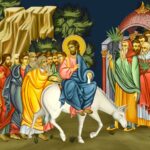Also called ‘Great and Holy Week,’ or ‘Passion Week,’ Holy Week in the Christian year is the week preceding Easter. Holy Week has five days of special significance, which start on Palm Sunday, the Sunday before Easter, until Holy Saturday (Black Saturday), but doesn’t include Easter Sunday. Did you know? The day commemorating Jesus’ crucifixion and death, Good Friday, has been celebrated since 100 A.D. as a day of fasting? This means that Christians around the world have celebrated Holy Week and observed different services during the week for over 1,900 years!
History of Holy Week
Holy Week has names for the five special days in the week, beginning with Palm Sunday or Passion Sunday, which commemorates Jesus’ triumphal entry into Jerusalem. The following day is called Holy Monday when Jesus cursed the fig tree, sent out the merchants from the temple, and responded to those who questioned His authority. On Holy Tuesday, some observe Christ foretelling his own death.
The next day is called Holy Wednesday or Spy Wednesday, which remembers how Judas arranged the betrayal of Jesus with the chief priests, since he was a spy among the disciples of Jesus. Some churches celebrate Tenebrae (the Latin for ‘shadows’ or ‘darkness’) services especially on Spy Wednesday, where they gradually extinguish lit candles while reciting and chanting a series of readings and selected psalms. Holy Wednesday is then followed by the ‘Triduum’ of Holy Week — Maundy Thursday, Good Friday, and Holy Saturday.
Deriving its name from a shortened form of the Latin word ‘mandatum’ meaning ‘command,’ Maundy Thursday (also called Holy Thursday) commemorates Christ’s “new commandment” that his disciples love one another as He has loved them (John 13:34). Maundy Thursday also marks the Last Supper that Jesus shared with His disciples, His prediction of His death, His betrayal by Judas Iscariot, and His arrest at the Garden of Gethsemane. Maundy Thursday services also include an act of foot washing, commemorating how Jesus washed His disciples’ feet as an act of service preceding His arrest.
Known as the most somber day for Christians, Good Friday remembers Jesus’ trial before Pontius Pilate, His death sentence, torture, crucifixion, death, and burial. Some Christians fast on Good Friday, while some avoid eating meat, and many attend a church service where they meditate on and venerate the cross of Christ. The Triduum of Holy Week concludes with Holy Saturday, the seventh day of the week, when Jesus rested in the tomb. On this day, Christians observe a late-night two-part Easter Vigil service. Jesus’ resurrection on the eighth day, is celebrated as Easter, marking the beginning of the Easter week, and the season of Eastertide.
Holy Week timeline
Jesus is sentenced to death by Pontius Pilate, the Roman prefect in the province of Judea from 26 to 36 A.D.
Solomon’s Temple in Jerusalem is destroyed as was foretold by Jesus before His death.
The Gallic woman, Egeria, pens what is regarded as the first recording of Holy Week observances while she makes a pilgrimage to the Holy Land.
The Vatican reestablishes Easter Vigil as an important Holy Week service.
Holy Week FAQs
What happens on the days of Holy Week?
During Holy Week, Christians around the world recall the events preceding Jesus’ betrayal, arrest, trial, torture, death by crucifixion, and His resurrection. Beginning with Palm Sunday, the week includes five special days of important significance. Preceding Holy Saturday (Black Saturday), the last day of Holy Week, is Good Friday, which commemorates Jesus’ agony and death on the cross. This day is observed as a day of somberness, mourning, and fasting.
What are the seven days of Holy Week?
In Western Christianity, the Holy Week comprises Palm Sunday (sixth Sunday of Lent), Holy Monday, Holy Tuesday, Holy Wednesday (Spy Wednesday), Maundy Thursday (Holy Thursday), Good Friday, and Holy Saturday (Black Saturday). Some Christians also observe Easter Vigil late Saturday night preceding Easter Sunday.
Why is Holy Week so special?
To Christians, Holy Week is significant because it reminds them of how God sacrificed His only Son, Jesus Christ, as a sign of His love and a plan of redemption for His people. The day also celebrates how God raised Jesus from the dead, and how He destroyed and overcame the power of sin and death forever. Through the observance of Holy Week, Christians can reflect on the last week of the life of Jesus.
How to Observe Holy Week
Join church services
Churches across the world, Lutherans, Anglicans, Methodists, Presbyterians, and Catholics, observe different services throughout Holy Week to recall and celebrate the events preceding Jesus’ betrayal, arrest, trial, death, and resurrection. You can join a church in your community to pray and observe any of these ceremonial services, starting with the triumphal entry on Palm Sunday.
Watch Easter movies
There are many classic and contemporary Easter movies you can watch alone, with your children, or with family and friends. Great examples include Mel Gibson’s “Passion of the Christ,” “Ben-Hur,” “Risen,” “The Last Temptation of Christ,” “Hop,” and “The Ten Commandments.” Some of these movies and more are a great way to bond with the family as the week wraps up.
Make it real for the kids
Children mostly learn by seeing, so it’s important to set the scene to reflect the season. Clean up the house with them, and team up to make crafts such as palm crosses, colored eggs, and decorate Easter baskets. Organize Bible quizzes about Holy Week and give special treats to the winners to make it competitive!
5 Fun Facts About Easter
‘White House Easter Egg Roll’
The President of the United States and their families have celebrated ‘The White House Easter Egg Roll’ event since 1878.
Passover in French
‘Pâcques,’ the French word for ‘Easter,’ originates from the Greek word for Passover — the Jewish holiday celebrated at about the same time of the year.
Not a federal holiday
Good Friday — the day commemorating Jesus Christ’s crucifixion – isn’t a federal holiday and is recognized as a holiday in only 12 states.
New clothes for good fortune
According to old superstitions, wearing new clothes on Easter meant you would have good luck for the rest of the year.
Billions for Easter candy
Americans spend almost $2.5 billion on Easter candy every year, making it the second biggest candy holiday after Halloween.
Why Holy Week is Important
It’s a week of love in action
Holy Week demonstrates the apex of sacrificial love. It is the week to recall how God gave His Son, Jesus, to the world in love. We can also remember Jesus’ words to love each other as He has loved us, and extend this selfless love to everyone, far or near.
A time for sober reflection and reconciliation
Through Holy Week and its observances, we can remember the agony of Jesus, the unjust treatment and punishment meted out to Him, His death, and resurrection. Just like He forgave Peter, who denied Him, and the Roman soldiers who tortured Him, we too can think about seeking forgiveness and making things right with those we’ve hurt, and to also forgive those who have wronged us.
A time to pray and worship
Holy Week is a week of religious observances and traditional activities. Starting with the joyful Palm Sunday procession with palm branches, we praise God and worship His Son, the Prince of Peace, and His mighty deeds among His people. Through the week, we don’t just mourn Christ’s death by crucifixion, but we also celebrate His triumph over death, joining the host of heaven to praise Him.
Holy Week dates
| Year | Date | Day |
|---|---|---|
| 2024 | March 24 | Sunday |
| 2025 | April 13 | Sunday |
| 2026 | March 29 | Sunday |
























